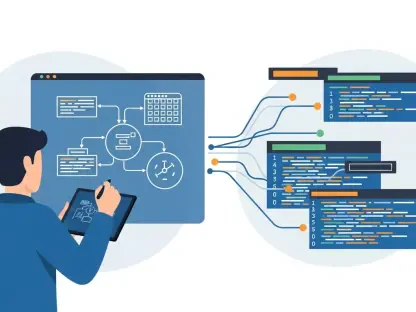In today’s fast-paced digital landscape, enterprises often find themselves juggling a mix of cloud-based and legacy systems. This hybrid IT environment presents unique challenges for managing DevOps processes. While cloud-native applications benefit from streamlined deployment pipelines, legacy systems require more intricate handling. This article explores how managed DevOps services can bridge the gap, ensuring efficient deployment and management of applications across diverse infrastructures.
The Complexity of Hybrid IT Environments
Challenges of Mixed Systems
Enterprises rarely operate in an ideal scenario where all applications and infrastructure are cloud-based. Instead, they manage a blend of new and old systems, cloud-based and traditional infrastructure, and modern and outdated applications. This mix introduces layers of complexity, especially when changes to new applications impact older systems. Interconnected software, hardware, and networking components require careful coordination, often overwhelming existing DevOps teams.
The complexity is further compounded by the necessity of maintaining interoperability between old and new systems. Legacy applications often have dependencies on particular hardware or software components, making straightforward upgrades difficult. Additionally, older systems may lack the flexibility to adapt to new DevOps tools and methodologies, necessitating custom solutions or workarounds that can consume significant resources and time. These challenges underscore the need for a cohesive approach to managing hybrid IT environments to ensure that both new and legacy systems operate efficiently.
Two-Speed Enterprises
In a ‘two-speed’ enterprise, managing both modern cloud infrastructures and legacy systems is a dual challenge. Dividing DevOps work across separate teams can lead to inefficiencies and increased costs due to skill duplication and inactivity during non-peak times. Full-scale modernization to move everything to cloud environments, while beneficial, is impractical due to enormous costs and the sheer number of applications involved.
The two-speed approach highlights the disparity in development and deployment speeds between modern and legacy environments. Cloud-based applications benefit from rapid iteration and deployment cycles, while legacy systems often require more meticulous planning and longer lead times. This disparity can create bottlenecks, as teams working on legacy systems struggle to keep pace with the agile practices employed by their cloud-focused counterparts. Furthermore, the duplication of specialized skills, such as those required for legacy system maintenance, can lead to underutilized staff and increased operational costs, making a unified approach to DevOps management essential for streamlining processes.
Managed DevOps Services as a Solution
Streamlining Processes
Managed DevOps services offer a pragmatic solution for hybrid IT environments. By partnering with a specialized provider, enterprise development teams can focus on building functionality while the managed service provider handles deployment and pipeline management. This approach involves a crucial knowledge transfer process, where initial documentation and team interviews help the provider understand existing structures and workflows.
The benefits of managed services extend beyond mere task delegation; they also introduce standardization and best practices across the development pipeline. Through continuous communication and collaboration, the managed service provider can identify areas for improvement and implement optimized processes that enhance operational efficiency. By leveraging the provider’s expertise, enterprises can ensure that deployments are consistent, reliable, and secure, thereby reducing the risk of errors and downtime. The collaboration facilitates smoother transitions between development and production environments, ensuring that new functionalities are deployed seamlessly across both cloud and legacy systems.
Enhancing Efficiency
The primary objective of managed DevOps is not just to maintain operations but to enhance processes. Combining in-house business and functionality insights with the deep DevOps expertise of a managed services partner allows for a consolidation of DevOps teams. This partnership ensures smooth and consistent deployment into production environments and facilitates the recommendation and implementation of improved workflows.
An essential aspect of enhancing efficiency is the ability to continuously monitor and optimize DevOps practices. Managed service providers employ advanced analytics and monitoring tools to gain real-time insights into system performance, identifying potential bottlenecks and areas for optimization. This proactive approach enables enterprises to address issues before they escalate, maintaining system performance and reducing downtime. Additionally, the managed service provider can implement automated testing and deployment processes, further streamlining operations and freeing up internal resources to focus on strategic initiatives that drive business growth.
Security and Compliance
Integrating Security from the Start
Security is a critical aspect of DevOps, especially in hybrid IT environments. Every code change has potential security implications, necessitating regular security assessments and checks. Managed DevOps services integrate security from the start, ensuring vulnerabilities are caught early. This proactive approach saves time and resources in the long run and helps enterprises comply with industry standards.
By embedding security into the DevOps lifecycle, managed services providers ensure that security measures are an integral part of development, rather than an afterthought. This includes implementing secure coding practices, conducting regular vulnerability scans, and performing penetration testing to identify and mitigate potential threats. Through continuous integration and continuous delivery (CI/CD) pipelines, automated security checks can be conducted at each stage of development, ensuring that any issues are addressed promptly. This proactive stance not only enhances the security posture of the enterprise but also boosts confidence in the reliability and integrity of both cloud-based and legacy systems.
Continuous Monitoring and Improvement
Managed DevOps services provide continuous monitoring and improvement of security practices. By leveraging the expertise of the managed service provider, enterprises can stay ahead of emerging threats and ensure their systems remain secure. This ongoing vigilance is essential for maintaining the integrity and reliability of both cloud-based and legacy systems.
The continuous improvement aspect of managed services extends beyond security, encompassing all facets of the DevOps process. By regularly reviewing and refining workflows, managed service providers can identify opportunities for optimization and implement changes that enhance overall efficiency. This iterative approach ensures that enterprises are always operating at peak performance, with reduced risk of security breaches and operational disruptions. By staying abreast of the latest security threats and industry best practices, managed DevOps services provide a robust framework for maintaining compliance and protecting sensitive data, enabling enterprises to focus on their core business objectives with confidence.
Benefits of Managed DevOps
Transparency and Efficiency
Managed DevOps services bring several significant advantages, including transparency and efficiency. By consolidating DevOps teams and processes, enterprises can accelerate development cycles and reduce app maintenance expenses. This streamlined approach eliminates staffing challenges by ensuring the right skills are available when needed, enhancing the overall development and deployment process.
Transparency is a vital component of the managed DevOps approach, enabling clear visibility into the entire development lifecycle. By utilizing centralized dashboards and reporting tools, enterprises can gain real-time insights into project status, performance metrics, and potential issues. This level of visibility fosters collaboration between development, operations, and security teams, ensuring that all stakeholders are aligned and informed. Furthermore, the managed service provider’s expertise in deploying cutting-edge tools and methodologies ensures that processes are continuously optimized, leading to faster development cycles and reduced time-to-market for new features and applications.
Competitive Edge
The standardized approach of managed DevOps services fosters a culture of continuous improvement within organizations. Consistency and quality in deployment processes empower businesses to adapt and evolve continuously. By aligning their DevOps approach with the operational speed of their business, enterprises can keep pace with market changes and competitive pressures, gaining a competitive edge in their respective markets.
A key advantage of managed DevOps services is the ability to scale operations rapidly and efficiently in response to changing business demands. By leveraging the provider’s resources and expertise, enterprises can quickly adapt to fluctuations in workload, ensuring that they can meet market demands without compromising quality. This agility is crucial in today’s fast-paced business environment, where the ability to innovate and respond to customer needs can determine success or failure. By adopting managed DevOps services, enterprises position themselves to capitalize on new opportunities, enhance customer satisfaction, and maintain a competitive edge in their industry.
Conclusion
In our current fast-paced digital world, businesses often find themselves managing a mix of cloud-based and traditional legacy systems. This blend creates a complex hybrid IT environment, bringing unique challenges to the DevOps processes. Cloud-native applications usually enjoy streamlined deployment pipelines, enabling faster and smoother operations. In contrast, legacy systems demand a more detailed and careful approach to handling. This article delves into how managed DevOps services can effectively bridge this divide, ensuring the efficient deployment and management of applications across a variety of infrastructures. Managed DevOps services offer tailored solutions that cater to the specific needs of both cloud-based and legacy systems. By leveraging these services, enterprises can achieve seamless integration and continuous delivery, optimizing performance while reducing downtime and operational costs. Moreover, managed DevOps can provide the tools and expertise needed to automate processes, enhance security, and ensure compliance, thereby supporting enterprises in navigating the complexities of a hybrid IT environment.









